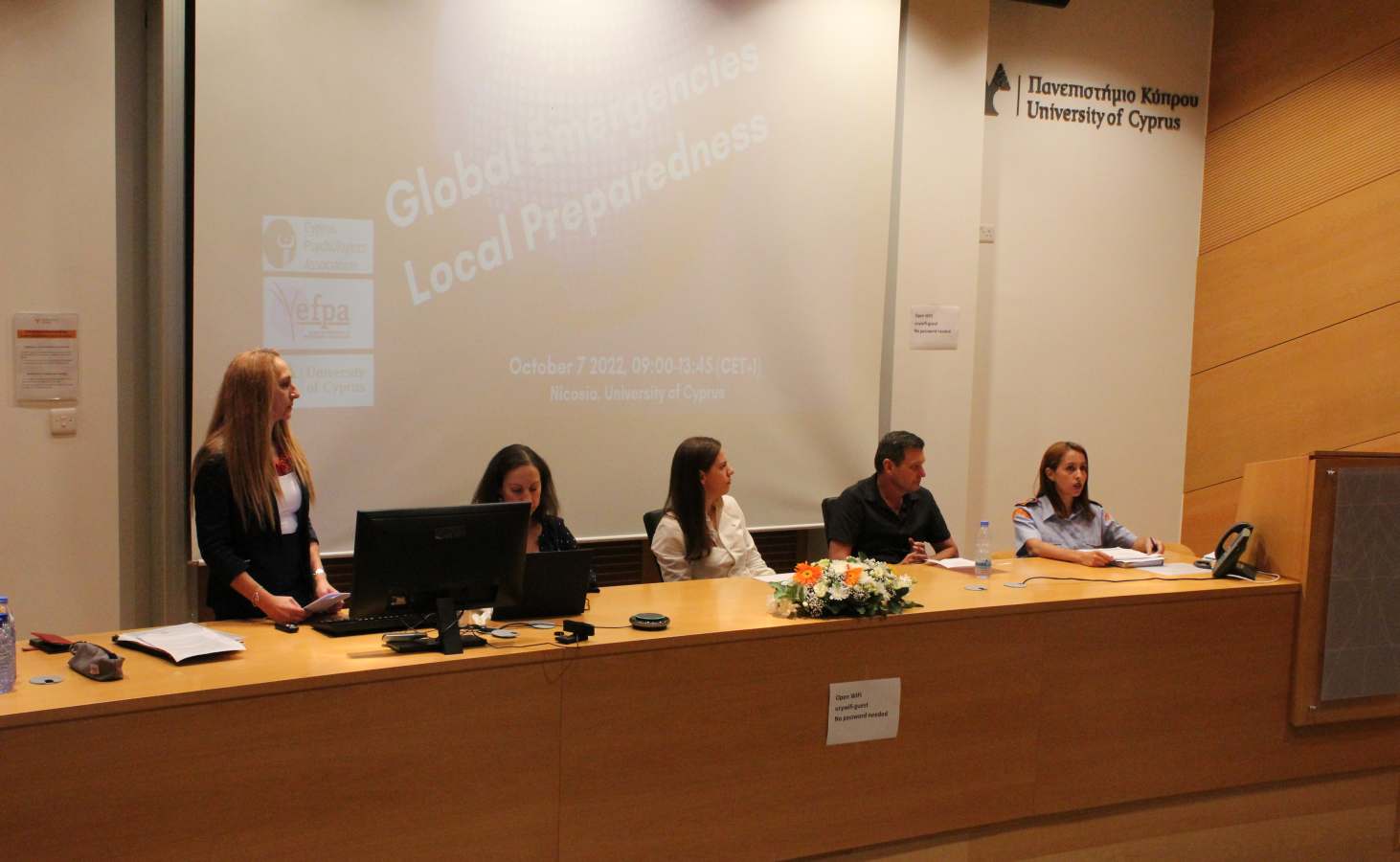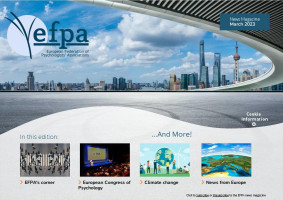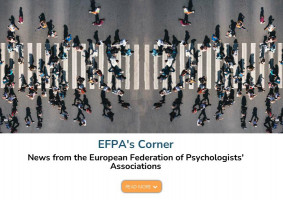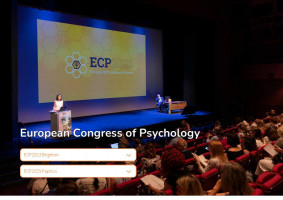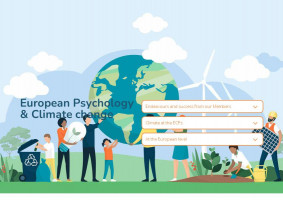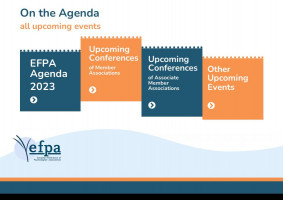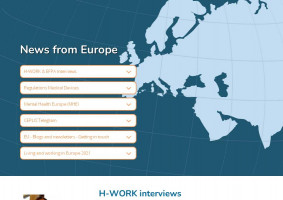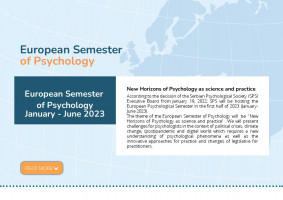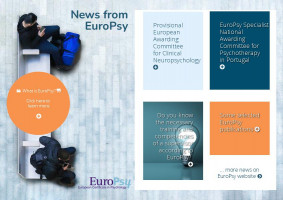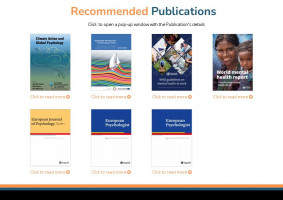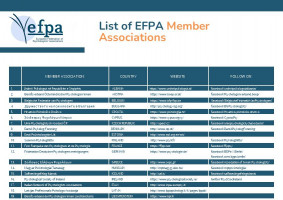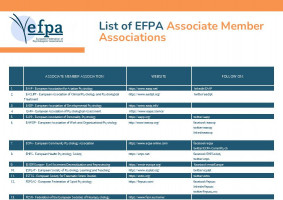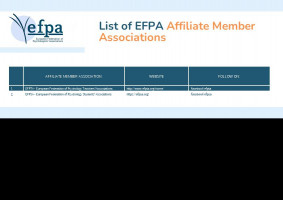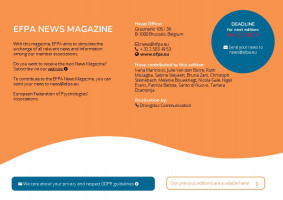_w1700_h800_1.jpg)
READ MORE
_w388_h484_1.jpg)
Dear colleagues,
[ To be updated ]
“Awareness of the importance of mental health is strong and on the rise in society at large and in the European institutions. And so is the need for psychological support.” That was one of our key messages on World Mental Health Day. Psychology is important and it is in demand as never before. But it is not an end in itself. After all, it is about the people who need help and support in their special situation. It is also about their relatives and friends, or colleagues at work. And in addition to high-quality offers of counseling and therapy, we are also concerned with prevention and assistance. And this is across the lifespan and from the individual to the family, friends, work team, neighborhood and community.
This newsletter now echoes many of these aspects, themes and offerings. But this issue of the Newsmagazine also highlights how interconnected the issue of mental health is with other important challenges and problems. Thus we inform about the effects of climate change, the initiatives and offers of our member associations, the COP27 as well as about our expert group on climate change or with the aim of a closer cooperation with the United Nations in Geneva.
In all initiatives, the close cooperation between the Executive Board, the Head Office, the volunteers in the groups and the member associations is evident. This was also noticeable at the last congress in Ljubljana. The many stimulating personal and professional encounters will certainly remain in our memories, as will the beautiful city and the impressive hospitality of our friends. Expertise, commitment and friendship was again palpable at the meeting of the Executive Council with the organizers of the upcoming European Congress in Brighton. ECP2023 in Brighton shows again how versatile and high quality psychology is in research and practice.
But we are also happy to report in this newsletter about the re-launch of the European semesters. We start with Lithuania and look forward to the upcoming Executive Council meeting and Presidents' Council meeting in Vilnius. Because the diversity and expertise of psychology is not only shown in topics and offers, but also in different very high quality profiles of the psychology of the countries.
Despite all diversity, independence and difference, we are united by the concern to promote a life of people in freedom and self-determination. Mental health and well-being thus becomes the goal but also the compass for our efforts. And because it applies to all people, it also applies to us. I.e. we also have to take care of ourselves and, with all our efforts for others, make sure that we ourselves have (mental) energy left! In this sense, I wish you not only much pleasure in reading the newsletter, but also times of rest again and again!
With all good wishes, yours,
Christoph Steinebach
EFPA President
FSP in Geneva
In our November edition we reported on EFPA's collaboration with the Federation of Swiss Psychologists (FSP), and the American Psychological Association (APA) to develop a presence for the science and profession of Psychology at the United Nations (UN) in Geneva.
Our FSP colleagues have recently published an issue of their magazine Psychoscope, which contains an article dedicated to the project of representative psychologists at the UN in Geneva. It has been published in French and in German.
UN Geneva Collaboration - update from the representatives
Your Newsmagazine reported in our November 2022 edition on the collaboration between the Federation of Swiss Psychologists (FSP), the European Federation of Psychologists’ Associations (EFPA), and the American Psychological Association (APA) to develop a presence for the science and profession of Psychology at the United Nations (UN) in Geneva. The representatives (Tobias Brosch, Karina Alves Pina and Yeniffer Rosas) have prepared this report on their work.
During the first trimester of the mandate, the three representatives had several meetings with key contacts of civil society and international organizations such as the Office of the High Commissioner for Human Rights, the Committee of the Rights of the Child and the previous Special Rapporteur on the right to health, Child Rights Connect, the WHO Behavioral Insights Team, the Geneva Science-Policy Interface, the UN Environment Program UNEP, the UN Office for Disaster Risk Reduction and other important key actors, raising awareness about our mission, vision and values, and laying the groundwork for future collaboration.
As our main objective is to encourage the development of psychologically informed policies and programs to help achieve the goals of sustainable development in the UN system, we initially focused on psychological contributions to combat climate change and promoting children’s mental health. Together with the American Psychological Association we contributed to the development of an advocacy document addressed to the United Nations Committee on the Rights of the Child, providing feedback on their General Comment on Children’s Rights and the Environment with a Special Focus on Climate Change (General Comment No. 26), and contributed to a psychological primer on risk communication which was transmitted to the UN Office for Disaster Risk Reduction’s Risk Knowledge team in Geneva last month.
The representatives moreover attended various events on human rights, mental health, and climate change organized by the international community and the Swiss government.
A copy of the letter APA submitted to the United Nations Committee on the Rights of the Child, providing feedback on children’s rights and the environment with a special focus on climate change, can be read here.
Gabriel Twose, Senior International Affairs Officer at the APA with special responsibility for the APA’s UN advocacy work said: “I am optimistic that our thoughts will be reflected in the final document, issued as guidance to governments around the world.”
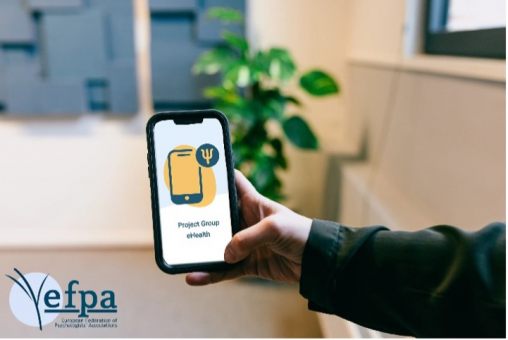
All psychologists in cyberspace?
By Tom Van Daele, Convenor of the EFPA Project Group eHealth
The project Group eHealth recently published an article on the use of online consultations by mental healthcare professionals. It aimed to document the uptake of online consultations in the early phases of the pandemic and explore if specific characteristics of psychologists across and beyond Europe could predict this.
-
Global survey
A total of 9115 healthcare professionals from 73 countries participated in the survey, of which about two-thirds used online consultations during the initial COVID-19 outbreak. Multiple determinants relating to the use and experience of online consultations were identified, including the professionals' age, experience with the technology before the outbreak, and the professional context.Importance of training
Strong evidence was also found for the importance and relevance of training of digital mental health. This strengthened earlier findings from a qualitative analysis of a subsample of the same survey, with data from 2082 professionals from Austria, Belgium, Cyprus, France, Germany, Italy, Lebanon, Lithuania, the Netherlands, Norway, Portugal, Spain, and Sweden. Both papers can offer arguments for the need to invest in additional training to support psychologists in creating optimal circumstances for selective and high-quality continued use of online consultations.
Recommendations for other technologies
As technology extends beyond online consultations, several recommendations can also be made regarding other forms of technology. Such guidelines can be found in an 2020 article highlighting recommendations on how to create the best possible context for e-mental health in which it supplements and enhances existing services. These recommendations are grouped according to 3 categories of key stakeholders: psychotherapists, health services and regulatory agencies, and developers.Importance of training
Strong evidence was also found for the importance and relevance of training of digital mental health. This strengthened earlier findings from a qualitative analysis of a subsample of the same survey, with data from 2082 professionals from Austria, Belgium, Cyprus, France, Germany, Italy, Lebanon, Lithuania, the Netherlands, Norway, Portugal, Spain, and Sweden. Both papers can offer arguments for the need to invest in additional training to support psychologists in creating optimal circumstances for selective and high-quality continued use of online consultations.
Recommendations for other technologies
As technology extends beyond online consultations, several recommendations can also be made regarding other forms of technology. Such guidelines can be found in an 2020 article highlighting recommendations on how to create the best possible context for e-mental health in which it supplements and enhances existing services. These recommendations are grouped according to 3 categories of key stakeholders: psychotherapists, health services and regulatory agencies, and developers.Free webinar on 22nd November
Want to learn more? As a prelude to a free 2023 EFPA webinar series on the potential of technology for psychology, an event will take place on 22 November 2022 at 3pm at Vilnius University, as a part of EFPA’s European Semester. You can either attend in person, or follow the livestream. More information can be found on the EFPA website. More deliverables from The project Group eHealth can be found there as well.
2nd International Nicosia Symposium on Crisis, Disaster and Trauma Psychology
7th October 2022, Nicosia, Cyprus
By Anthi Loutsiou, University of Cyprus, Cyprus Psychologists Association, Magda Rooze, EFPA Standing Committee Crisis, Disaster and Trauma Psychology, Eleni Karayianni, Cyprus Psychologists Association, University of Cyprus, EFPA Executive Council.
-
The second international symposium was organized again with great success by the Cyprus Psychological Association with the support of EFPA's Standing Committee on Crisis, Disaster and Trauma Psychology and in partnership with the University of Cyprus to commemorate the World Mental Health Day. The special theme of this year’s symposium was" Global emergencies, local preparedness" aiming to highlight that psychology as a science and an applied profession has a great deal to contribute to mental health in relation to crises, disasters, and emergencies.
Read more - text fold out
It was a great honor to have a keynote address from a representative of the World Health Organization (WHO- Europe). Ms. Melita Murko presented in the context of the pan-European Mental Health Coalition to promote the mental health agenda for 2021-2025, with special reference to the inclusion of mental health and psychosocial support in emergencies. There were three other sessions with invited speakers from Cyprus and six other European nations that covered a range of topics relating to psychosocial response preparedness and support to victims of various global emergencies such as the pandemic, natural disasters due to climate crisis, and forced migration due to war and political conflict.
The Standing Committee organized one of the sessions with four presentations from its members on lessons learned and best practices from various European countries. In another session, local experts from Cyprus shared a diverse insight on tools and systems of psychosocial support for vulnerable groups of people, such as children and the elderly.
In collaboration with EFPA’s Work Group on Climate Change, a special session on climate crisis was organized in alignment with one of EFPA’s fields of action for its 2021-2023 mandate. This session highlighted the psychosocial impact of natural disasters as a result of climate change and placed strategic emphasis on wild fires as a matter of national priority in Cyprus due to the country’s geographical location. This special topic of national importance was further analyzed in a roundtable discussion of experts at the end of the symposium.
The symposium was offered as free, hybrid event open to the public and was very well attended by almost 300 participants, in-person and on-line, from 22 countries. The technology milestones achieved during the pandemic crisis, were successfully leveraged by the organizers to open up the event to a larger audience locally and internationally. It brought together academics, community experts, students, policy makers, and other key stakeholders who share an interest in the field of Emergency and Trauma Psychology. It provided them with the opportunity to build national and cross-national collaborations to strengthen the capacity of European countries for psycho-social response preparedness in today’s global emergencies.
At a national level, the symposium contributed significantly to the development of the field and to the promotion of effective policy making in Cyprus. Local representatives from the Ministries of Education, Health and Interior and Civil Defense, and from key stakeholders from organizations such as Red Cross, Police, Fire and Rescue, and Phoenix Active Citizens attended the event and supported the strategic aims of the symposium. The Cyprus Ombudswoman for the Environment, who was also in attendance, made a public announcement at the end of the symposium with an initiative to create an inter-ministerial working group to facilitate the development of a more organized system of psychosocial support after wild fires in Cyprus that will be integrated in the state’s emergency response.
After the symposium, the Cyprus Psychological Association hosted the two-day, bi-annual meeting of the Standing Committee and offered warm hospitality with opportunities for networking, connection, and cultural exploration.
Follow us on
facebook

(1)_w1700_h406_1.png)
-
